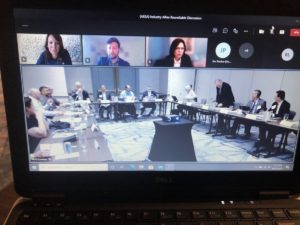Breaking Invisible Walls at Leadership Roundtables
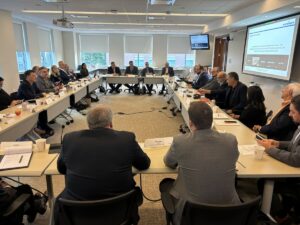
Industry roundtable participants connect with FAA and EASA representatives (far end of table) during the Oct. 17 meeting.
On Oct. 17, ARSA convened its annual Leadership Roundtables with representatives from the FAA, EASA, and 10 allied organizations joined the association’s board of directors for an afternoon of industry updates and discussion. The meeting series has provided the aviation community an in-person venue for substantive collaboration since 2018.
After a special luncheon for enterprise member representatives and an industry-only session focused primarily on career development needs, the group welcomed American and European regulators. During that final session, FAA Flight Standards Service Executive Director Larry Fields described the agency’s continuing reorganization as a “breaking invisible walls.” The description was an apt metaphor for the meeting’s content, which focused on areas where government oversight limits industry creativity and effectiveness.
Some highlights:
- Both FAA and EASA are working to address misunderstandings about parts documentation requirements associated with work performed under the U.S.-EU bilateral agreement. Upcoming revisions to the agreement’s Annex II and Maintenance Annex Guidance are being finalized.
- The FAA is assessing its procedures for legal interpretation review in light of the recent suspension of its problematic analysis of the “in person” requirement in 43.3(d).
- Both the Flight Standards and Aircraft Certification Services are updating professionalism, safety, and regulatory training for new personnel (see the Workforce Development and Training Report made by the SOCAC for reference).
- The Aircraft Certification Service is reassessing its current guidance regarding remote technology tools and techniques based on experience gathered since the COVID-19 pandemic.
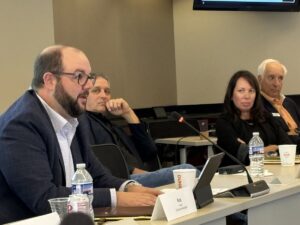
Rob Roedts, ARSA director and Columbia Helicopters vice president of aircraft solutions, speaks during the industry roundtable session on Oct. 17. ARSA Director Jon Silva or AeroKool Aviation, Choose Aerospace Executive Director Crystal Maguire, and ARSA Managing Director & General Counsel Marshall Filler listen on.
The government and industry representatives discussed how agency processes limit inspector flexibility. Rigid approaches to oversight, along with inconsistency across (and within) offices contribute to inefficient compliance and create safety risks. While the agency has cut its still-extended list of applicants awaiting certification, administrative slowdowns and workforce limitations continue to exacerbate issues for those seeking certificates as well as facilities holding them.
The group began the day with a short briefing from Choose Aerospace Executive Director Crystal Maguire. Organized in 2020, Choose Aerospace is a non-profit partnership providing resources to improve the availability of a diverse, qualified technical workforce. Its high school curriculum program has reached almost 1,500 students and provides foundational aerospace competency that can be a model for apprenticeships, career development resources, and recruitment pipelines for the industry.
After wrapping the roundtables, ARSA’s board met privately on Oct. 18 for its annual meeting. The association’s directors elected Bob Mabe of HAECO Americas to serve as the body’s 2025 president, John Riggs of Chromalloy as vice president, and Alison McHugh of FEAM Aero as treasurer. The group approved the 2025 budget as well as an amendment to the association’s bylaws that, among multiple updates, transitioned the association’s top-tier membership category into an “enterprise” election made by the member company.
To read amendment 5 of the association’s bylaws, click here.
In addition to ARSA and its board representatives, roundtable participants attended from the following organizations:
Aerospace Industries Association
Airlines for America
Aviation Suppliers Association
Aviation Technician Education Council
The Boeing Company
Cargo Airline Association
General Aviation Manufacturers Association
International Air Transport Association
Modification and Replacement Parts Association
National Air Transportation Association
NORDAM
Raytheon Technologies Corporation
Regional Air Cargo Carriers Association
For updates from previous roundtables, review the content below.
Previous collaborative sessions...
10/17/23 - Leadership Roundtables Hold Half-Full Glasses
October 17, 2024
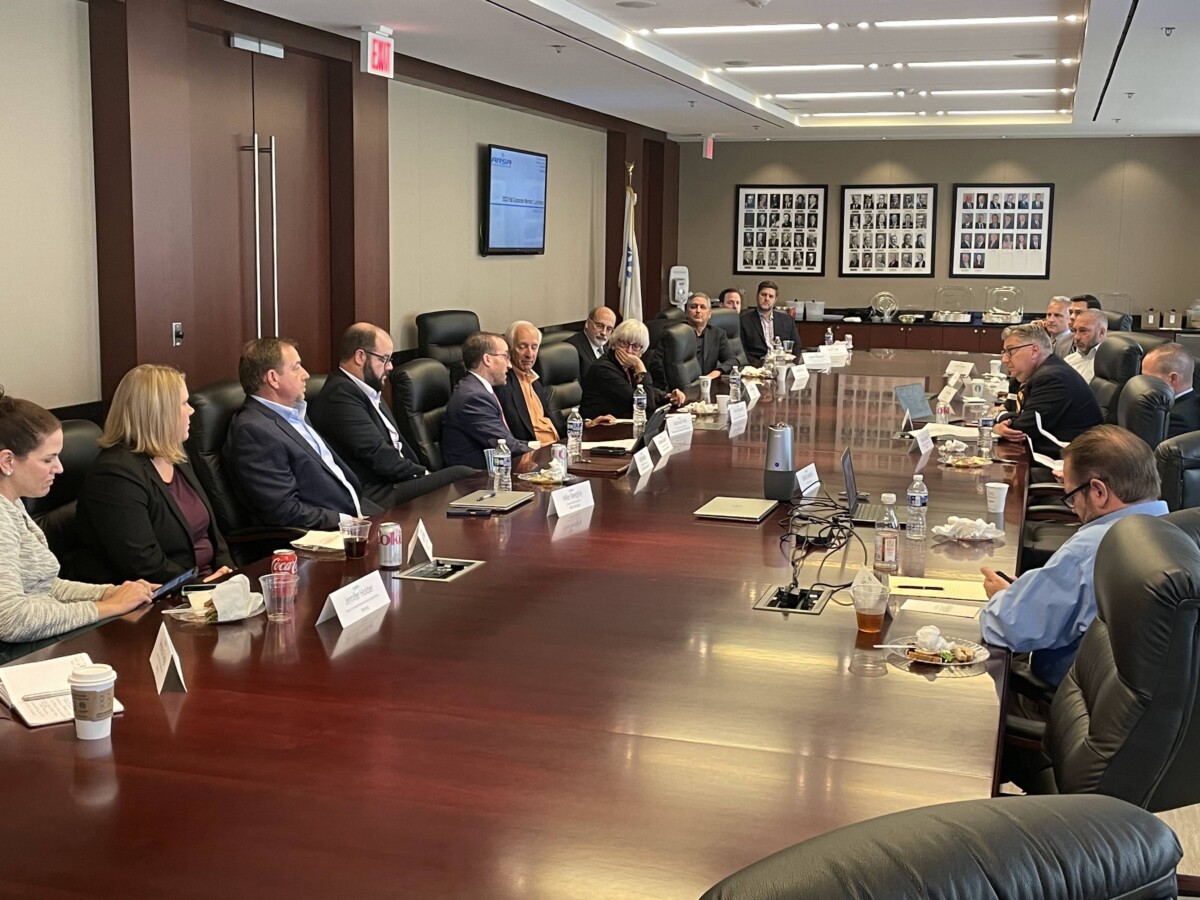
Participants in ARSA’s Corporate Member Luncheon on Oct. 12 listen to Andrew Giacini, speaking from the center of the far side of the table, report on Congress’ efforts to reauthorize the FAA.
On Oct. 12, ARSA convened its Annual Leadership Roundtable Sessions, hosting corporate members, ally trade association leaders, and legislative and regulatory representatives at the headquarters of Helicopter Association International in Alexandria, Virginia.
Key Corporate Member Contacts joined the association’s board of directors – which held its annual meeting separately on Oct. 13 – for a lunch discussion with Andrew Giacini. An experienced professional staff member on the House Aviation Subcommittee, Giacini shared insight on Congress’ efforts so far to reauthorize the FAA. Considering the generally positive reception of the House bill – numerous ARSA and industry priorities are addressed – Giacini offered realistic roadmaps for how the Senate could act on its so-far-stalled legislation and how lawmakers could approach reconciling the two bills.
After lunch, the room filled with colleagues from nine of ARSA’s closest trade association allies. Participants discussed key policy and compliance issues before being joined by FAA and EASA representatives for reports on agency priorities. While these discussions included frank points about oversight and compliance challenges, the group invested considerable attention in building on slow gains in regulator personnel development made since the 2022 Roundtables.
Seeing the glass as “half full,” to use a term repeated multiple times by the Larry Fields, executive director of the FAA Flight Standards Service, may be a challenge for all, but pressing towards improvement is a key ARSA role in supporting the maintenance community. The dialogue in the board room on Oct. 12 will continue on Capitol Hill and the meeting rooms of the Ritz-Carlton at ARSA’s Annual Conference next March. The association urges members to plan their attendance and build on the points made by its board, key member contacts, and allies during the Roundtables.
10/17/22 - Measuring Progress at Fall Roundtables
October 17, 2023
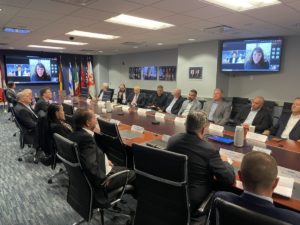
ARSA Leadership Roundtable Participants listen as ATEC Executive Director Crystal Maguire (on screen) briefs the group on rollout of the new AMTS rule. The association’s board of directors was joined (online and in-person) by representatives from ten allied organizations before the arrival of FAA and EASA personnel.
On Oct. 13, ARSA hosted its annual Leadership Roundtable sessions in Washington, D.C. Each year, the association focuses the attention of its board of directors – in town for its annual meeting the following day – on the issues most important to aviation stakeholders from across the regulatory chain.
The event began with at Old Ebbitt Grille, where the board was joined by corporate member representatives and special guest Michael Reynolds of Baker, Donelson, Bearman, Caldwell & Berkowitz, PC. Reynolds shared his experience from years working in aviation policy as a congressional staffer and shared his expectations for the upcoming FAA reauthorization cycle.
After lunch, the day shifted to the offices of the General Aviation Manufacturers Association, which hosted the group while ARSA administered roundtable discussions with allied organizations and FAA officials. Representatives from ten trade associations that regularly collaborate with ARSA each shared updates on recent activity, points of focus and needs for improving policy in the coming year.
After welcoming the group, GAMA President & CEO Pete Bunce opened discussion by highlighting the need to produce more data – and improved insight – related to regulatory issues facing the industry. Heading into the FAA reauthorization process, Bunce explained, demands that the aerospace community effectively illustrate the challenges it faces every day.
“You can’t fix something you can’t measure,” Bunce said.
In the spirit of measuring progress – or at least establishing baselines – the group highlighted a series of challenges faced by their members at the hands of FAA oversight. Based on those issues, discussion centered on the importance of government personnel development and training in order to ensure regulators have the competency to support the critical thinking demanded by aviation safety.
Here’s a basic rundown of the updates provided by each organization:
General Aviation Manufacturers Association – Focused on how the industry can help the FAA through policy, noting especially the need to improve training, restructure pay and benefits, and overhaul the government procurement process.
Aerospace Industries Association – Highlighted the importance of “predictability” as cousin of “consistency” in regulatory enforcement. Noted the challenge of re-thinking how aviation careers will progress for new entrants into the industry.
Aircraft Electronics Association – Chronicled experience co-leading Part 145 Working Group with ARSA and focus on the history of the rule in order to inform how to fix myriad points of contention between the rule, guidance and inspector tribal knowledge.
Aircraft Owners and Pilots Association – Continued attention on legislation to create a National Center for the Advancement of Aviation, a public-private partnership that would act as a clearinghouse for all actions related to bolstering the industry and its workforce.
Airlines for America – Brought up the importance of the Air Traffic Control workforce to air carrier operations and recounted ongoing challenges related to 5G rollout.
Aviation Technician Education Council – Celebrated success in promulgation of new Aviation Maintenance Technician Schools rule (14 CFR part 147), sharing experience in “educating FAA’ and benefitting from agency’s collaboration on rollout.
International Air Transport Association – Reminded about importance of protecting open skies and maintaining stable resources for industry to continue to emerge from pandemic disruptions.
Modification and Replacement Parts Association – Discussed how inspectors’ incentives (and the metrics tied to them) impact behaviors in ways that slow down certification and surveillance.
National Air Transportation Association – Described challenges related to slow movement on certification projects and manual reviews.
Regional Airline Association – Underscored importance of growing (and protecting) service to airports outside of major hubs and metropolitan areas.
After the discussion ended – though it could have continued – the group was joined by the executive directors of the FAA’s Aircraft Certification (AIR) and Flights Standards (AFS) Services, Lirio Liu and Larry Fields, and EASA Washington Representative Ludovic Aron.
Liu and Fields focused considerable attention on agency internal management issues, including plans for further reorganization of certification personnel and the need to improve training for government personnel. The two described opposite challenges in workforce readiness: AIR tends to employ early career engineers, while AFS inspectors are generally late career and out of industry. The former needs seasoning in industry while the later needs detoxification from year’s spent building personal experience that may not jive with the actual language of the rules. Aron noted that EASA’s organization is fairly stable, but faces dilemmas related to harmonizing oversight across international borders.
As highlighted for members in the August edition of the hotline by 2022 President Terrell Siegfried, the annual roundtable sessions are a microcosm of the engagement available to all members:
“This level of access and its resulting productivity is not exclusively for board members. Each March, the Annual Conference allows you to interact with agency leaders, association allies, and professional colleagues – in person or from behind a computer screen. We offer so many opportunities to expand your network, connect with key industry players, stay in the know, share your knowledge, and get things done.”
Save the dates for the 2023 Conference: March 14-17 in and around the nation’s capital.
10/26/21 - Leadership Roundtable Returns to New World
October 26, 2021
On Oct. 21, ARSA’s Board of Directors returned as a group to the Nation’s Capital – and to face-to-face collaboration – for the first time since March 2020. The association’s volunteer leaders met with industry allies and FAA aviation safety executives during an afternoon event focused on emerging issues in aviation business, particularly workforce and career development. The technology in use was more advanced, the participants more dispersed and the global market more complicated than in previous events, but the focus on good work was the same as ever.
On Thursday afternoon, directors gathered at the Ritz-Carlton, Pentagon City in Arlington, Virginia (site of ARSA’s Annual Conference, save the dates for 2022). They were joined by colleagues from numerous industry groups both at the Ritz and online, with remote participants connected to the meeting room via Microsoft Teams. During open discussion, the group reviewed key issues related to pandemic recovery, personnel management and aviation career development.
The meeting was then joined by Jodi Baker and Larry Fields, the deputy executive directors of the FAA Aircraft Certification and Flight Standards services. Baker and Fields continued the day’s focus, reviewing agency efforts and plans to overhaul knowledge development and training for government personnel as well as how best to manage oversight of an advancing industry.
Both FAA executives described work – with appropriate references to frustrating experience – to improve how agency personnel approach industry issues. They described problems with inspectors whose oversight is based only on personal experience. After Baker underscored how inspectors have often pressed certificate holders to comply with that tribal knowledge rather than the plain language of the rules, Fields pressed the government’s desire to change the paradigm.
“You can’t survive thinking that way,” Fields said. “You just can’t.”
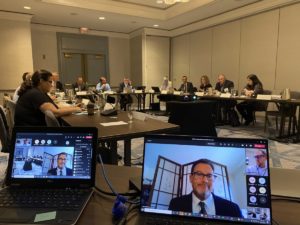
FAA Flight Standards Deputy Executive Director Larry Fields is visible on a Teams meeting screen as in-room participants listen to Aircraft Certification Deputy Executive Director Jodi Baker (behind microphone with red light).
Closing out the discussion, ARSA Executive Director Sarah MacLeod welcomed that perspective and extended the challenge. “I’m encouraged by the willingness to hear again,” MacLeod said. “We have to be willing to do the same in industry, in my opinion.”
“Hearing” is central to events like ARSA’s Leadership Roundtable and key to the association’s broad efforts to engage broadly with industry stakeholders. While the pandemic has produced new challenges and opportunities, the long-running work of collaborative engagement must continue.
After completing the afternoon roundtable discussions, the Board reconvened for its Annual Board meeting on Friday, Oct. 22. Association members should refer to the October edition of the hotline for board report details.
10/18/19 - Collaboration via ARSA Board Roundtable with Industry, FAA
October 18, 2019
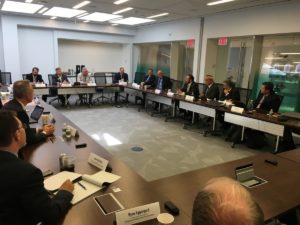
ARSA board members and association allies participate in an Oct. 17 roundtable at the headquarters of Airlines for America in Washington, D.C.
On Oct. 17 and 18, ARSA’s Board of Directors made its regular fall visit to the nation’s capital. For the second year, directors participated in an afternoon industry roundtable before returning to the Ritz-Carlton Pentagon City (site of ARSA’s Annual Conference each March; stay tuned for 2020 registration information) for the board’s annual meeting.
Following the model established in 2018, the Thursday roundtable session featured member engagement, discussions with allied associations and facetime with the FAA. After lunch at the Old Ebbitt Grill with D.C. representatives from ARSA member companies, the board headed down the street the Airlines for America’s headquarters for an afternoon of substantive discussion.
Reflecting ARSA’s years’ worth of coalition building efforts – particularly its ongoing campaign to establish and federally fund aviation workforce grant programs – the roundtable discussion brought strong participation from other industry trade associations. Each ally representative gave a short briefing on the most pressing issues facing the organization’s membership. These reports reflected the diversity of the industry’s interests and underscored the need for the aviation community to support one another, bolstering efforts across a wide range of topics.
A quick glance at the concerns of each organization in attendance:
Aircraft Electronics Association – Reconciling the plain language of 14 CFR part 145 with FAA guidance and enforcement of the repair station rule. (AEA Vice President of Government & Industry Affairs Ric Peri is co-chair with ARSA Executive Director Sarah MacLeod on the ARAC Part 145 Working Group.)
Aircraft Owners and Pilots Association – Supporting the national airspace and developing legislation to establish a center for aviation excellence to study and support industry needs.
Aviation Suppliers Association – Removing all regulatory and business impediments (and preventing new ones) to the safe handling and shipment of aircraft parts.
Aviation Technician Education Council – Overhauling and modernizing 14 CFR part 147, the rule governing aviation maintenance training schools.
Helicopter Association International – Educating policymakers about the harmful impacts of legislation aiming to limit the use of helicopter air tours or rotorcraft operations in specific geographic areas.
Modification and Replacement Parts Association – Ensuring that regulatory developments are safety focused while supporting necessary systems, procedures and resources to utilize PMA/DER repairs.
National Air Carrier Association – Helping make good use (and limit increases) of passenger facility charges and supporting reasonable, safety focused promulgation of rules related to aircraft seat pitch and evacuation.
National Air Transportation Association – Dealing with enforcement inconsistencies and setting standards for “through the fence” maintenance as well as educating industry regarding use of aircraft management companies.
Regional Airline Association – Managing requirements related to aircraft certification and management of resources required by the regulators for operation.
In addition to these specific interests, each presenter noted concern and focus on growing the aviation workforce of the future. This central theme, on which ARSA has focused for several years, has become a galvanizing force for the aerospace community, attracted the attention of lawmakers across the country and has become a primary interest of new FAA Administrator Steve Dickson.
The administrator’s workforce focus – which ARSA encouraged in its letter welcoming him to the agency – was relayed along with other points of interest when executives from the FAA’s Office of Aviation Safety (AVS) arrived for the second half of the afternoon. Associate Administrator for Aviation Safety Ali Bahrami, Flight Standards Executive Director Rick Domingo, Policy and Innovation Division Director Mike Romanowski and Certification Procedures Branch Manager Dan Elgas stayed beyond their allotted time to interact with the group. After fielding questions and covering points from the AVS Strategic Plan, the government officials encouraged industry to help address problems in oversight by sharing clear examples.
The value of the meeting’s collaboration was best described by Jim Coon, AOPA senior vice president of government affairs and advocacy. “[Each of us] may care about a lot of issues,” Coon said during his briefing, relaying a lesson learned from his experience in Washington, “but you can only work one issue at a time.”
Considering the diversity of needs on display during the roundtable and the deep impact of the few central problems facing the aviation community, the importance of collaboration is quite clear. Since its only possible to work one issue at a time, managing them – and going deep enough on the big ones – takes teamwork. ARSA, its team members and the volunteer leaders on its board demonstrated shared commitment to that cooperation throughout the event.
10/16/18 - Board, Ally and Regulator Face Time
October 16, 2018
On Oct. 11, ARSA welcomed its board of directors to Washington, D.C. for an afternoon of aviation industry meetings.
Co-hosted by the General Aviation Manufacturers Association (GAMA) at its Washington, D.C. headquarters, the event included a series of roundtable discussions among and between association allies and FAA personnel. Participants discussed legislative initiatives, regulatory issues and ways to improve government oversight that support safety standards in conjunction with business interests.
After a two-hour industry-only strategy session, the group welcomed Rick Domingo, FAA Flight Standards Service executive director, and Christ Carter, deputy executive director for strategic initiatives of the agency’s Aircraft Certification Service. Domingo and Carter were joined by David Balloff, a senior advisor to Acting Administrator Dan Elwell focused on industry engagement and outreach, and Rolandos Lazaris, executive officer of the Aircraft Maintenance Division.
The FAA representatives provided a quick overview of ongoing initiatives within the agency, then discussed its work and strategic focus in the context of the industry’s needs. ARSA’s executive team, board members and industry allies used the time to seek opportunities for the aviation community to help improve oversight, meet mutual goals and improve the business environment.
“Industry pays twice when the FAA isn’t strong,” said ARSA Executive Director Sarah MacLeod, explaining why certificate holders – and those representing them – have a vested interest in supporting aviation safety regulators. MacLeod’s point was that aviation businesses must invest in regulatory compliance regardless of agency effectiveness, but suffer additional costs from unclear rules, inconsistent guidance and unpredictable oversight predicated on the whims of unevenly-managed inspectors.
The association managed the event in conjunction with the board’s 2018 Annual Meeting to emphasize the overarching strategy for broad industry engagement and leadership. Having built a reliable coalition on regulatory and legislative matters, ARSA will continue to provide venues through which the industry can regularly collaborate.
In addition to ARSA, GAMA and FAA representatives, the following groups were represented at the meeting:
Click the name of an organization to see the number of posts and pages referencing it on ARSA.org (the same is true of GAMA’s link above):
Aerospace Industries Association
Aircraft Electronics Association
Airlines for America
Aviation Suppliers Association
Aviation Technician Education Council
Modification and Replacement Parts Association
National Air Carrier Association
Stay tuned for coverage of the board’s meeting and the quarterly “What Has ARSA Done Lately” in the October edition of the hotline.




